Iran Continues Issuing Harsh Sentences Against Protesters
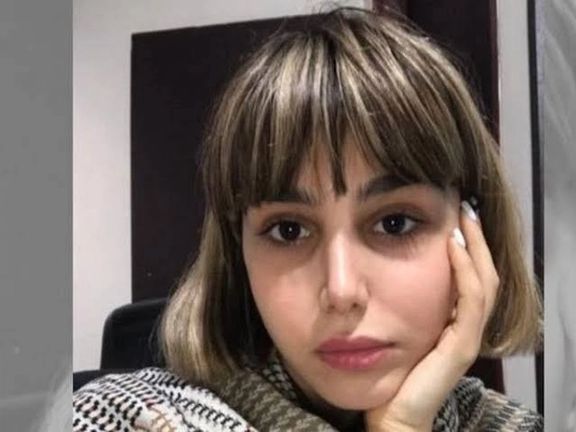
The Iranian regime continues to issue harsh sentences, including whipping and long-term imprisonment against journalists, students, teachers, lawyers, and other protesters.

The Iranian regime continues to issue harsh sentences, including whipping and long-term imprisonment against journalists, students, teachers, lawyers, and other protesters.
Nazila Maroufian, a journalist, was sentenced to two years in prison, fined 15 million tomans (almost 350 USD) and banned from leaving the country for five years on the charge of "propaganda and publishing lies through an interview with Mahsa Amini's father".
Mahsa Amini, a 22-year-old Kurdish woman was killed in police custody for not having proper hijab in mid-September and her death led to weeks of nationwide protests against the Islamic Republic.
Another journalist, Vida Rabbani was sentenced to 11 years behind bars. Her mother wrote a letter to the chief justice saying that “Vida, now at the age of 33 has to spend 11 years of her young age behind bars arbitrarily upon verdicts issued based on bias.”
On the other hand, US-based Human Rights Activists News Agency (HRANA) reported that Zahra Mehrabi, a student of Tehran University and one of the detainees from nationwide protests, has been sentenced to five years of suspended imprisonment by a revolutionary court.
Amnesty International has also warned that Arshiya Takdastan, an 18-year-old protester who was arrested during the protests north of Iran, has been sentenced to a double death sentence on charges of "war against God" and "corruption on earth".
Amnesty also drew attention to the case of Mehdi Mohammadifar, a 19-year-old protester who has also received a double death sentence.
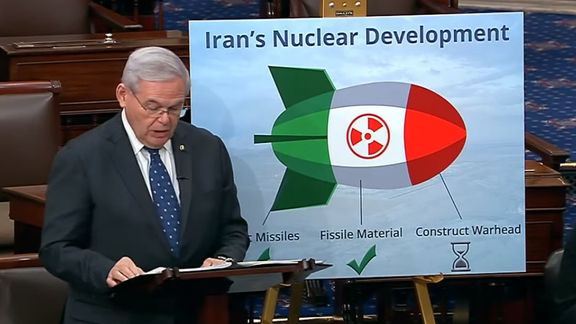
Members of the US Congress are ramping up efforts to pass new legislation in support of Iranian protesters and sanctions on top officials for rights violations.
A bipartisan group of Senate Foreign Relations Committee members and others numbering at least 28 Senators are re-introducing legislation in support of protests in Iran.
In a statement issued January 26, US Senators Bob Menendez (D-NJ), Chairman of the Senate Foreign Relations Committee, Marsha Blackburn (R-Tenn.), Chris Coons (D-Del.), Jim Risch (R-Idaho), Ranking Member of the Senate Foreign Relations Committee, and James Lankford (R-Okla.) announced that the resolution will call on the international community “to continue publicly highlight and condemn the Iranian regime’s crackdown since protests began…”
The resolution also urges the Biden administration “to strengthen international efforts to impose additional sanctions on officials and entities responsible for the violent suppression of demonstrations.”
In more than four months of popular protests, Iranian security forces have killed around 500 people, wounded hundreds and arrested up to 20,000 others. The government also executed four detained protesters in December and many more either face the death penalty or charges that could end in death sentences.
On the same day that Senators issued their statement the House of Representatives overwhelmingly approved a resolution expressing solidarity with Iranian protesters.
The 420-1 rare bipartisan vote marked the latest round of international condemnations against Iran’s government, which has deepened its isolation.
“It is vital that we in the US House of Representatives, a body that is among the greatest symbols of freedom and democracy around the world, stand with one voice to affirm our support for the brave Iranian people,” Rep. Claudia Tenney, R-NY, said during floor debate Wednesday.
The Washington Beacon also reported Friday that according to its sources House Republicans and Democrats are joining forces to sanction Iran’s Supreme Leader Ali Khamenei, who is the commander in chief of the armed forces, and other top regime officials for human rights crimes.
The legislation is dubbed the Mahsa Amini Act after the 22-year-old woman who was fatally wounded in hijab police custody in September and died in hospital. Her death triggered the anti-regime uprising by young people and women.
The Biden administration has imposed a series of sanctions on regime officials and entities since September, but sanctioning Khamenei directly for gross human rights violations will be a strong gesture for the international community and most Iranian who see him as the ultimate decider in the country.
It will also make more negotiation to revive the 2015 nuclear deal (JCPOA) more difficult, as Tehran will likely demand these sanctions to be removed before it agrees to curb its nuclear program.
Indirect talks that the Biden administration initiated in April 2021 have failed to revive the Obama-era agreement and some experts believe a new deal must be negotiated.
Republicans oppose resuming any negotiations with the Islamic Republic amid its killing of protesters and provocative moves, including supplying kamikaze drones to Russia for its war in Ukraine.
The Mahsa Amini Act was introduced in the previous Congress, but Democrats did not support the measure. Now, with Republicans in majority, the Washington Beacon says, “Democratic foreign policy leaders are lending their support to the bill.”
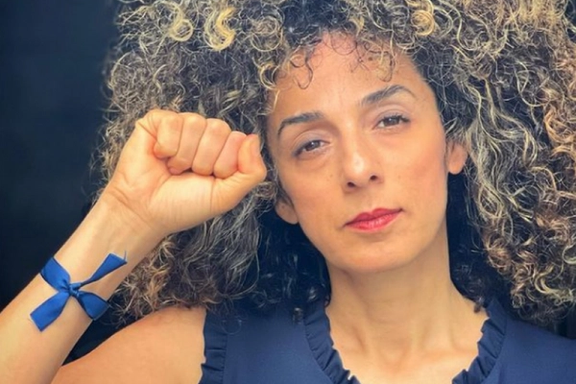
Iranian activist and author Masih Alinejad says the plot by the Iranian regime to kill her makes her more powerful to fight for democracy.
"I'm not scared," Alinejad told the AP after US authorities announced charges against three people who attempted to kill her on behalf of Iranian intelligence.
"I want to tell you that the Iranian regime thinks by trying to kill me, they will silence me, or silence other women. But they only strengthen me, make me more powerful to fight for democracy and give voice to brave women who are facing guns and bullets in the streets to get rid of the Islamic Republic."
Alinejad said the assassination attempt shows that the Islamic Republic is terrified of Iranian women demanding their rights, which she often promotes through social media. “They are scared of their own people,” she said. “Like millions of others I want freedom for my country. I don’t deserve to die for that.”
The US Justice Department on Friday charged three men with conspiring to assassinate the dissident Iranian activist and journalist.
Rafat Amirov, Polad Omarov and Khalid Mehdiyev were charged with murder-for-hire and money laundering for their role in the thwarted Tehran-backed plot, the Department of Justice said in a statement.
Iran has assassinated or kidnapped hundreds of opponents abroad in its four-decade history. Germany, France, Turkey and Iraq were among countries where Iranian intelligence conducted many deadly operations against opponents.

Reports from Zahedan in Iran’s southeast say plainclothes security forces violently detained dozens of protesters, especially teenagers, on Friday during protests.
Hal Vash website, which monitors the news of Sistan-Baluchestan province, reported Friday that "arrests of Baluch citizens in the city of Zahedan has greatly expanded."
Meanwhile, activists reported the mass arrest of protesters by plainclothes forces in the city on Friday when they were returning home from Friday prayers.
A video released on social media shows the arrest of young protestors in Zahedan. In the video, plainclothes security forces are violently arresting several young protestors and taking them by force to the vehicles.
During the mass protests on the 17th consecutive Friday in Zahedan, several cases of shooting and firing of tear gas by the military forces have also been reported.
The regime had beefed up security measures in Zahedan since Wednesday on the eve of the 17th Friday of protests. They deployed security forces and set up checkpoints in many areas of Zahedan.
Despite tight security measures, thousands of residnets once again took to the streets in Zahedan and chanted anti-government slogans after participating in Friday prayers and listening to prominent leader Mowlavi Abdolhamid’s sermon.
The Friday protests in Zahedan started on September 30thwhen the people of the city peacefully demonstrated against the killing of Mahsa Amini in police custody and the rape of a 15-year-old Baluch girl by the Chabahar police chief. Regime forces opened fire killing almost 100.
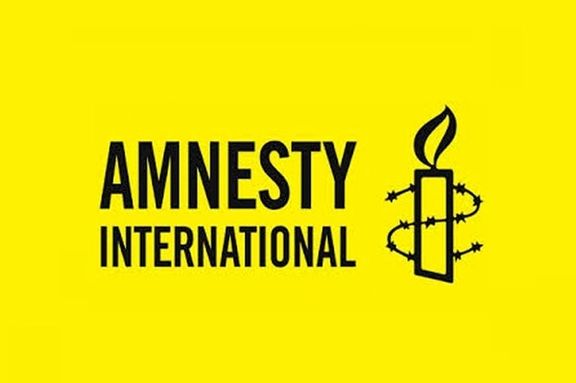
Amnesty International says the Islamic Republic must immediately reverse the convictions and death sentences of three young protesters who were subjected to torture.
The international human rights group said on Friday that the three protesters were tortured by “floggings, electric shocks, being hung upside down and death threats at gunpoint.”
Amnesty has also learned that Revolutionary Guard agents raped one of them and sexually tortured another by placing ice on his testicles for two days.
Arshia Takdastan, 18, Mehdi Mohammadifard, 19, and Javad Rouhi, 31, each received two death sentences in December 2022 for “war against God” and “corruption on earth”.
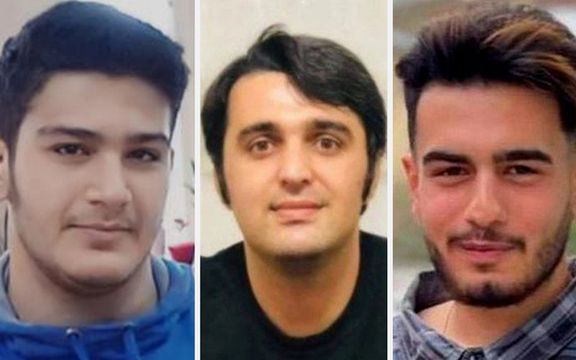
The court says the young men have “incited” arson by throwing headscarves into bonfires during protests in Noshahr, in northern Manzandaran province on September 21.
Javad Rouhi has received the third death sentence as he has confessed under duress that he burned a copy of the Quran during protests.
“The fact that Arshia Takdastan, Mehdi Mohammadifard and Javad Rouhi and their anguished relatives live under the shadow of execution while Revolutionary Guard agents and prosecution officials reasonably suspected of responsibility or complicity in their sexual abuse and other forms of torture enjoy absolute impunity highlights the sheer cruelty and inhumanity of Iran’s judicial system,” noted Diana Eltahawy, Amnesty International’s Deputy Director.
“The Iranian authorities must immediately quash the convictions and death sentences of these young men and drop all charges related to their peaceful participation in protests,” she added.
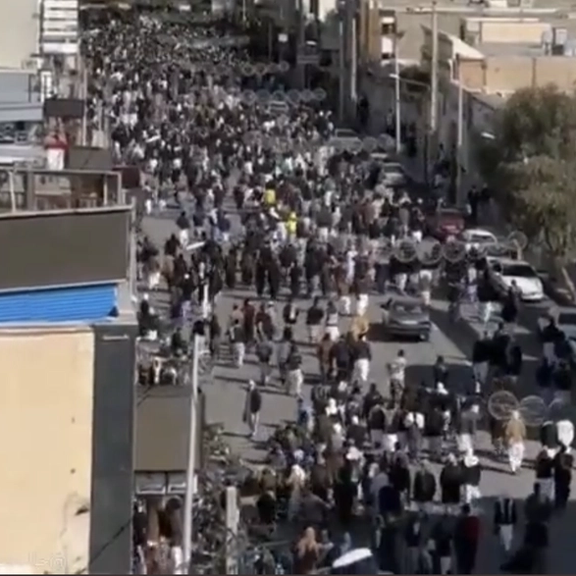
Security forces opened fire on protesters in the Iranian city of Zahedan who held rallies for the 17th consecutive Friday since protests broke out in September.
According to videos published on social media, the regime’s security forces also used teargas to disperse the residents of Zahedan who were chanting antigovernment slogans after they left the Makki Mosque, where they attended the Friday prayers led by the outspoken Sunni cleric Mowlavi Abdolhamid.
People in other cities of Baluch and Sunni majority Sistan-Baluchestan province, such as Rask and Khash also poured onto the streets to renew their opposition to the Islamic Republic. Similar rallies by Iranian Sunni Muslims in the city of Galikash, in the northern Golestan province, were also held outside the home of the city’s Sunni cleric Mowlvi Mohammad Hossein Gorgij, the deposed Friday Imam of Azadshahr. Meanwhile, in the southwestern city of Izeh, in Khuzestan province, a memorial ceremony was held for Hossein Saeedi, a protester who was killed in the city 40 days ago.
Gorgij, who was also summoned to the special court for clergy after his dismissal, appeared among the protesters and criticized the policies of the regime as incorrect, saying that “it has been 45 years that the Islamic Republic is chanting ‘death to America,’ that resulted in the fall of its currency to 450,000 (against the US dollar).
His dismissal has led to public outrage and protests. The Shiite clerical authorities made the move as a reaction to some of his remarks that were deemed insulting to Shia sanctities. Gorgij, however, issued a statement afterwards to apologize, clarifying that his speech was misinterpreted, and he meant no disrespect towards the Shias.
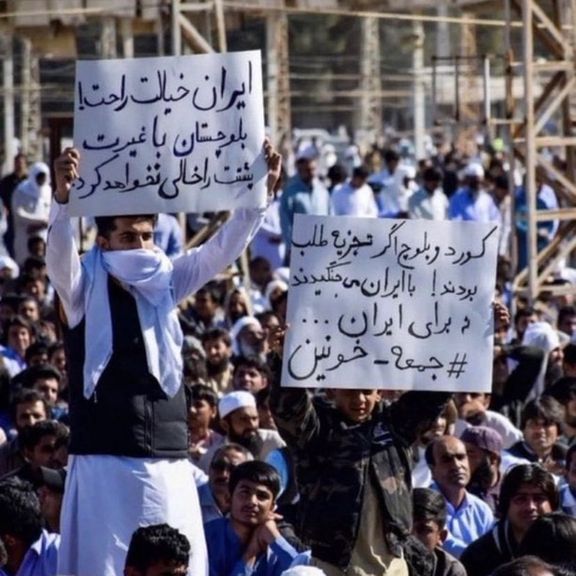
In the videos posted on social media Friday, people are heard chanting slogans against the regime, including its ruler Ali Khamenei who was referred to as “the dictator” as well as the Basij militia of the Revolutionary Guard, who are seen as responsible for than 500 civilian deaths in the past four months.
During his Friday prayer sermons, Mowlavi Abdolhamid, the most influential Sunni cleric in Iran, talked about widespread poverty across the country and emphasized that people supported the 1979 revolution in Iran for the same reasons they protest today. He also called for the abolition of the death penalty in the country. Most of the people executed in Iran are from the Baluch minority along with the Kurds. "Today, people are crying for the justice they wanted in the 1979 revolution; They want freedom, and they are stuck in poverty, hardship and problems."
He described the empathy and unity of Iranians inside and outside the country as exemplary, saying that the people of Iran regard freedom of speech and assembly as their rights and want to be able to choose capable managers to run the country.
"Our nation is not in favor of executions. This people are the owners of their country, and they want the authorities to exercise caution in issuing death sentences and executing people,” he added.
In the 133 days since the death in custody of 22-year-old Mahsa Amini, in addition to 500 people killed in antigovernment protests, about 20,000 people have been arrested and hundreds wounded seriously. Many young people have lost one or both eyes because security forces fired pellets at their faces.
The regime has so far executed four people and dozens are sentenced for ‘moharebeh’ -- meaning “fighting God'' in the lexicon of the Iranian regime -- and ‘corruption on earth’ that carry the death penalty.